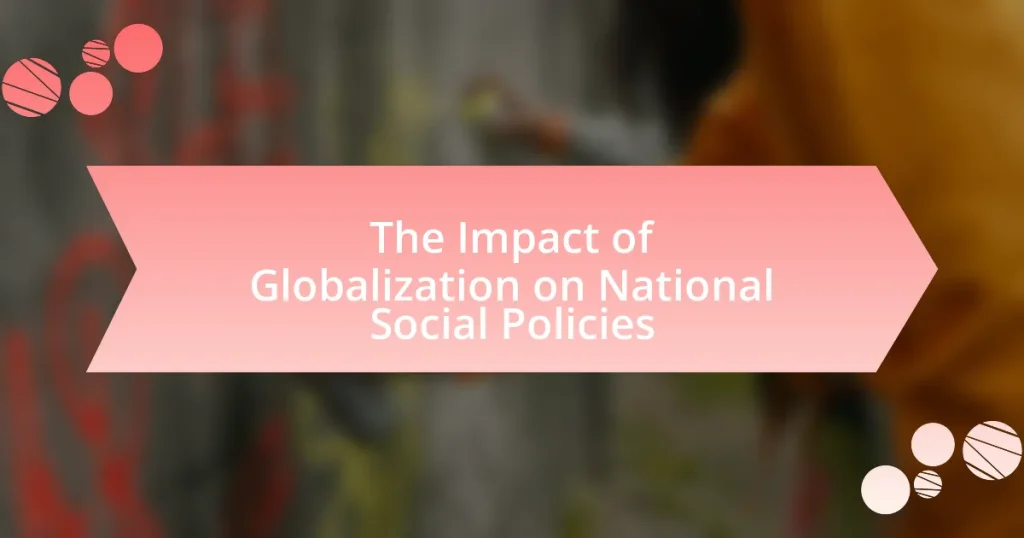The article examines the impact of globalization on national social policies, highlighting how international standards and practices shape domestic frameworks. It discusses the convergence of social policies due to economic integration, technological advancements, and cultural exchanges, as well as the influence of international organizations like the United Nations and the World Bank. Key factors affecting social policies include economic pressures, the need for competitiveness, and the challenges of maintaining social equity. The article also explores the implications of globalization on healthcare and education policies, emphasizing both the opportunities for policy enhancement and the risks of increased inequality and reduced social protections.

What is the Impact of Globalization on National Social Policies?
Globalization significantly influences national social policies by promoting the adoption of international standards and practices. As countries engage in global trade and cooperation, they often align their social policies with those of other nations to remain competitive and attract investment. For instance, the adoption of labor rights and environmental regulations has been observed in many countries as a response to global market pressures. According to the International Labour Organization, over 90% of countries have ratified at least one core labor standard, reflecting the impact of globalization on national policy frameworks. This alignment can lead to improved social protections but may also result in a race to the bottom, where countries lower standards to attract business.
How does globalization influence the development of national social policies?
Globalization influences the development of national social policies by promoting the exchange of ideas, practices, and standards across borders, leading to policy convergence. As countries engage in international trade and cooperation, they often adopt similar social policies to remain competitive and meet global norms. For instance, the adoption of labor standards and environmental regulations in various nations can be traced back to international agreements and organizations, such as the International Labour Organization, which sets guidelines that member states are encouraged to follow. This interconnectedness results in a blending of social policies, as nations look to align their frameworks with those of their trading partners and global best practices.
What are the key factors of globalization affecting social policies?
The key factors of globalization affecting social policies include economic integration, technological advancement, cultural exchange, and international governance. Economic integration leads to increased trade and investment flows, which can pressure governments to adopt policies that enhance competitiveness and reduce social spending. Technological advancement facilitates the rapid dissemination of information and ideas, influencing public opinion and policy-making processes. Cultural exchange promotes the adoption of global norms and values, which can reshape social policies to align with international standards. Lastly, international governance structures, such as the United Nations and World Trade Organization, establish frameworks that influence national policy decisions, often prioritizing economic growth over social welfare. These factors collectively shape how countries formulate and implement their social policies in a globalized context.
How do international organizations shape national social policies?
International organizations shape national social policies by providing frameworks, guidelines, and funding that influence government decisions. For instance, the United Nations and the World Bank offer policy recommendations and financial assistance aimed at improving social welfare systems, which countries often adopt to align with international standards and secure funding. Research shows that countries receiving support from the International Monetary Fund frequently implement social policy reforms that reflect the organization’s priorities, such as poverty reduction and social equity. This dynamic illustrates how international organizations can effectively steer national policy agendas through economic incentives and normative pressures.
Why is understanding the impact of globalization on social policies important?
Understanding the impact of globalization on social policies is important because it shapes how nations respond to economic, social, and cultural changes. Globalization influences labor markets, social welfare systems, and public health policies, requiring countries to adapt to international standards and practices. For instance, the International Labour Organization reports that globalization has led to increased competition, which can pressure governments to reform social policies to protect workers’ rights and ensure equitable access to resources. This adaptation is crucial for maintaining social cohesion and addressing inequalities that arise from global economic integration.
What are the potential consequences of globalization on social equity?
Globalization can lead to increased social inequity by exacerbating income disparities and marginalizing vulnerable populations. As economies become interconnected, wealth tends to concentrate among those with access to global markets, often leaving low-skilled workers and marginalized communities behind. For instance, a report by the International Labour Organization in 2020 indicated that globalization has contributed to a widening income gap, with the richest 10% of the global population earning 52% of total global income, while the poorest 50% earn just 8%. This disparity can result in reduced access to essential services, such as education and healthcare, for disadvantaged groups, further entrenching social inequities.
How does globalization affect public welfare systems?
Globalization significantly impacts public welfare systems by increasing competition among nations, which often leads to reduced government spending on social programs. As countries strive to attract foreign investment and enhance economic growth, they may prioritize tax cuts and deregulation over robust welfare provisions. For instance, a study by the International Labour Organization in 2019 indicated that many nations have shifted resources away from social safety nets to create a more business-friendly environment, resulting in weakened public welfare systems. This trend can exacerbate inequality and limit access to essential services for vulnerable populations, as governments face pressure to minimize expenditures in favor of economic competitiveness.

What are the main effects of globalization on specific national social policies?
Globalization significantly influences national social policies by promoting economic integration, which often leads to the adoption of neoliberal policies that prioritize market efficiency over social welfare. Countries may reduce public spending on social services to attract foreign investment, as seen in many developing nations that have liberalized their economies. For instance, the World Bank’s 2020 report highlights that countries like India and Brazil have restructured their social policies to align with global market demands, resulting in decreased funding for health and education. Additionally, globalization can lead to the convergence of social policies, where nations adopt similar frameworks, often influenced by international organizations such as the International Monetary Fund and the World Trade Organization, which advocate for specific policy reforms. This trend can dilute local cultural values and social safety nets, as evidenced by the shift in welfare policies in European countries in response to EU regulations.
How does globalization affect healthcare policies in different countries?
Globalization significantly influences healthcare policies in different countries by promoting the exchange of ideas, technologies, and practices across borders. This interconnectedness leads to the adoption of international health standards and practices, as seen in the World Health Organization’s guidelines, which many nations incorporate into their healthcare systems. For instance, countries like Canada and the UK have adapted their healthcare policies to include evidence-based practices that originated from global research collaborations. Additionally, globalization can result in the privatization of healthcare services, as seen in countries like India, where increased foreign investment has led to a shift towards market-driven healthcare models. This shift often prioritizes efficiency and profitability, impacting access and equity in healthcare delivery.
What are the challenges faced by national healthcare systems due to globalization?
National healthcare systems face significant challenges due to globalization, including increased demand for healthcare services, the spread of infectious diseases, and disparities in healthcare access. Increased demand arises as globalization facilitates the movement of people, leading to higher patient volumes and strain on resources. The spread of infectious diseases, such as COVID-19, exemplifies how global travel can rapidly disseminate health threats, overwhelming national healthcare systems. Additionally, globalization often exacerbates disparities, as wealthier nations may attract healthcare professionals from poorer countries, leading to a brain drain that undermines the healthcare capacity of those nations. These challenges highlight the complex interplay between globalization and national healthcare systems, necessitating coordinated responses to ensure equitable health outcomes.
How do global health initiatives influence local healthcare policies?
Global health initiatives significantly influence local healthcare policies by providing funding, setting standards, and promoting best practices. For instance, initiatives like the Global Fund to Fight AIDS, Tuberculosis and Malaria allocate resources that enable local governments to implement effective health programs. Additionally, organizations such as the World Health Organization establish guidelines that local policymakers adopt to improve health outcomes. Evidence shows that countries participating in global health initiatives often experience improved health metrics, such as reduced disease prevalence and increased vaccination rates, demonstrating the direct impact of these initiatives on local policy formulation and implementation.
In what ways does globalization impact education policies?
Globalization impacts education policies by promoting standardization, increasing access to information, and fostering international collaboration. Standardization occurs as countries adopt similar curricula and assessment methods to align with global educational benchmarks, such as the International Baccalaureate or the OECD’s PISA assessments. Increased access to information is facilitated through digital technologies, enabling students and educators worldwide to share resources and best practices, thereby enhancing educational quality. Furthermore, globalization encourages international collaboration through partnerships and exchange programs, allowing for the sharing of innovative teaching methods and educational research. For instance, the Bologna Process in Europe exemplifies how countries have reformed higher education systems to promote compatibility and mobility across borders.
What role do international educational standards play in shaping national policies?
International educational standards significantly influence national policies by providing benchmarks for quality and equity in education systems. These standards, established by organizations such as UNESCO and the OECD, guide countries in aligning their educational frameworks with global best practices. For instance, the OECD’s Programme for International Student Assessment (PISA) results have prompted numerous nations to reform their curricula and assessment methods to improve student outcomes and competitiveness. Additionally, adherence to international standards can facilitate cross-border educational collaborations and enhance the mobility of students and professionals, further shaping national educational policies to meet global demands.
How does globalization affect access to education in developing countries?
Globalization enhances access to education in developing countries by facilitating the exchange of knowledge, resources, and educational practices. This process allows for increased investment in educational infrastructure and technology, often supported by international organizations and foreign aid. For instance, the World Bank reported that countries integrating into the global economy tend to receive more funding for educational initiatives, which can lead to improved literacy rates and school enrollment figures. Additionally, globalization promotes the adoption of innovative teaching methods and curricula from developed nations, further enriching the educational landscape in developing regions.

What are the challenges and opportunities presented by globalization for national social policies?
Globalization presents both challenges and opportunities for national social policies. One significant challenge is the pressure on governments to reduce social spending in favor of attracting foreign investment, which can lead to weakened social safety nets. For instance, countries may prioritize tax incentives for corporations over funding for healthcare or education, resulting in increased inequality. Conversely, globalization offers opportunities for national social policies to adopt best practices and innovations from other countries, enhancing service delivery and efficiency. For example, international collaborations can lead to improved public health strategies, as seen in the global response to pandemics, where countries share knowledge and resources. Thus, while globalization can undermine social protections, it also provides avenues for policy enhancement through international cooperation and learning.
What challenges do national governments face in adapting social policies to globalization?
National governments face significant challenges in adapting social policies to globalization, primarily due to the need to balance domestic priorities with international pressures. These challenges include the erosion of national sovereignty, as global economic forces can undermine local policy decisions, making it difficult for governments to implement effective social safety nets. Additionally, the increasing mobility of capital and labor complicates the ability of governments to regulate and provide for their citizens, as multinational corporations may relocate to countries with more favorable policies, leading to a race to the bottom in labor standards and social protections. Furthermore, the diverse needs of a globalized population require governments to navigate complex cultural and social dynamics, which can strain existing social frameworks. For instance, the OECD reports that globalization has led to rising income inequality in many countries, challenging governments to create equitable policies that address these disparities while remaining competitive in a global market.
How do economic pressures from globalization affect social policy decisions?
Economic pressures from globalization significantly influence social policy decisions by compelling governments to adapt their policies to remain competitive in a global market. As countries face increased competition from international trade and investment, they often prioritize economic growth and efficiency, which can lead to reduced public spending on social programs. For instance, a study by the International Labour Organization in 2019 highlighted that countries with open economies tend to cut welfare benefits to attract foreign investment, thereby impacting social safety nets. This shift can result in a focus on policies that favor labor market flexibility over comprehensive social protection, ultimately affecting the well-being of vulnerable populations.
What are the implications of cultural globalization on social policy?
Cultural globalization significantly influences social policy by promoting the exchange of ideas, values, and practices across borders, which can lead to the harmonization of social standards. This exchange often results in the adoption of progressive social policies, such as those related to gender equality and human rights, as countries look to align with global norms. For instance, the spread of concepts like universal healthcare and social welfare systems can be traced back to international advocacy and shared cultural values, which have been reinforced by organizations such as the United Nations. Additionally, cultural globalization can create challenges for local traditions and social structures, prompting policymakers to navigate the tension between global influences and local needs.
What opportunities can arise from globalization for enhancing social policies?
Globalization presents opportunities for enhancing social policies by facilitating the exchange of best practices and resources among nations. This exchange allows countries to adopt successful social policy frameworks from others, leading to improved outcomes in areas such as healthcare, education, and social welfare. For instance, the World Health Organization’s initiatives demonstrate how countries can collaborate to improve public health policies, resulting in better health metrics globally. Additionally, globalization can increase funding and investment in social programs through international partnerships and foreign aid, enabling nations to expand their social safety nets and address inequalities more effectively.
How can international cooperation improve national social policies?
International cooperation can improve national social policies by facilitating the exchange of best practices and resources among countries. Collaborative efforts, such as those seen in the European Union, enable member states to adopt successful social policy frameworks that address issues like poverty reduction and healthcare access. For instance, the EU’s Social Investment Package encourages countries to invest in social policies that promote employment and social inclusion, leading to improved outcomes in member states. Additionally, international organizations like the United Nations provide guidelines and support for developing comprehensive social policies, which can enhance national strategies by incorporating global standards and evidence-based approaches.
What best practices can be adopted from other countries’ experiences with globalization?
Countries can adopt best practices from globalization by implementing inclusive economic policies, enhancing education systems, and fostering international cooperation. For instance, Scandinavian countries like Sweden and Denmark have successfully integrated social welfare systems with market economies, ensuring that globalization benefits all citizens. These nations prioritize education and skills training, which has led to high employment rates and economic resilience. Additionally, countries such as Germany have embraced vocational training programs that align with industry needs, facilitating smoother transitions for workers in a globalized economy. These examples demonstrate that strategic investments in social policies and education can mitigate the adverse effects of globalization while maximizing its benefits.
What practical strategies can national governments implement to address the impact of globalization on social policies?
National governments can implement practical strategies such as enhancing social safety nets, promoting inclusive labor market policies, and fostering international cooperation to address the impact of globalization on social policies. Enhancing social safety nets involves expanding access to unemployment benefits, healthcare, and education to support vulnerable populations affected by global economic shifts. For instance, countries like Sweden have successfully integrated comprehensive welfare programs that adapt to changing economic conditions. Promoting inclusive labor market policies includes enforcing fair labor standards and ensuring workers’ rights, which can mitigate the adverse effects of globalization on job security. The International Labour Organization reports that countries with strong labor protections experience lower rates of inequality. Lastly, fostering international cooperation through trade agreements that include social clauses can help ensure that globalization benefits are shared equitably, as seen in the European Union’s approach to integrating social policy considerations into trade negotiations.
